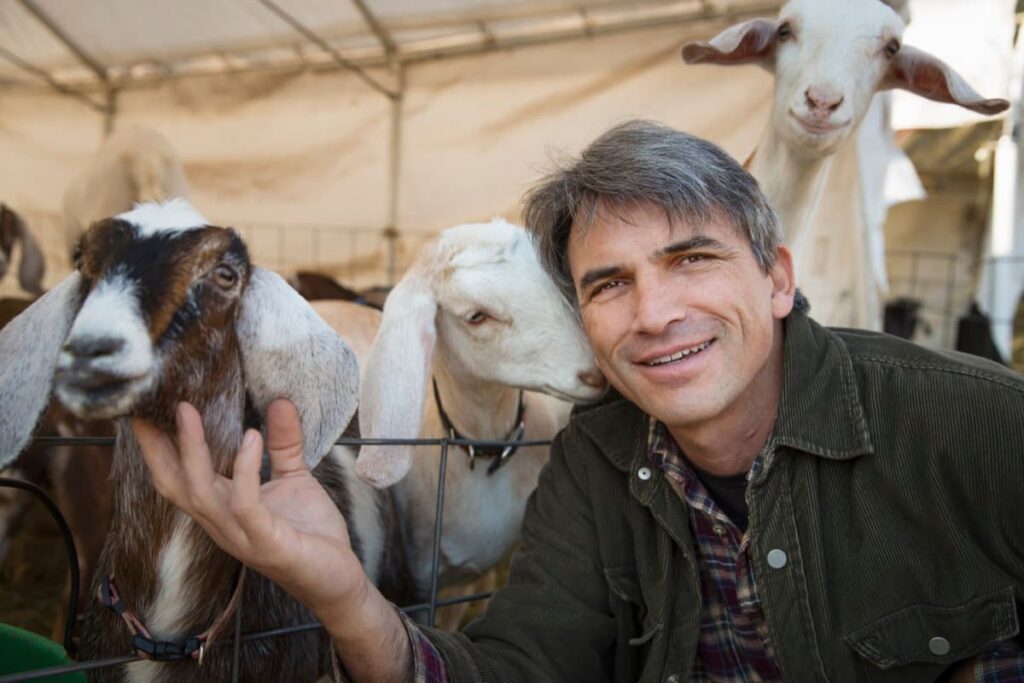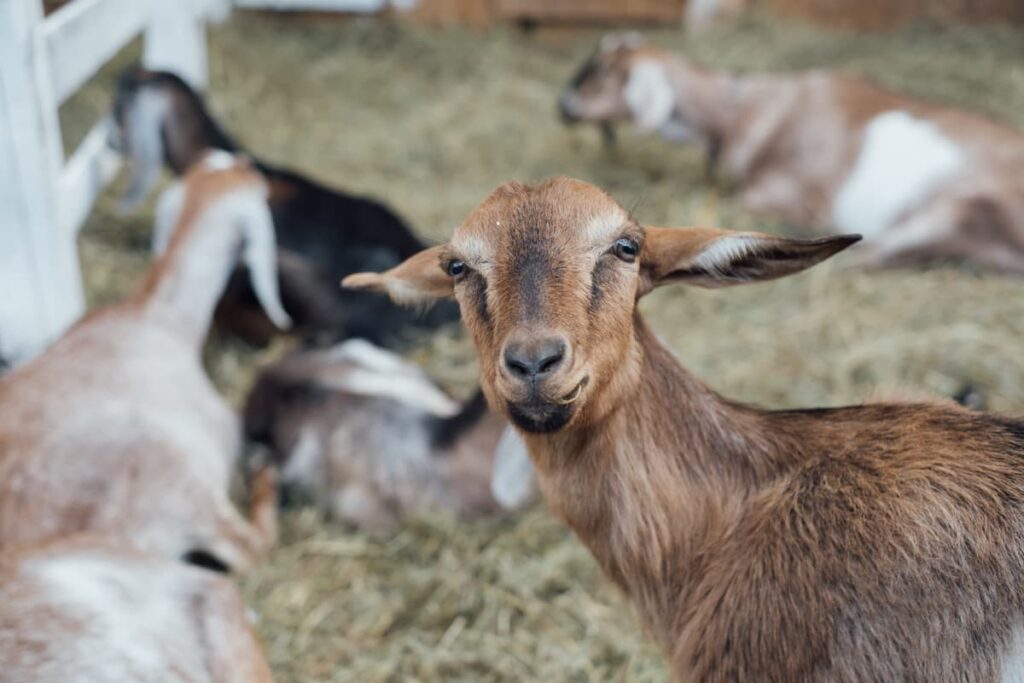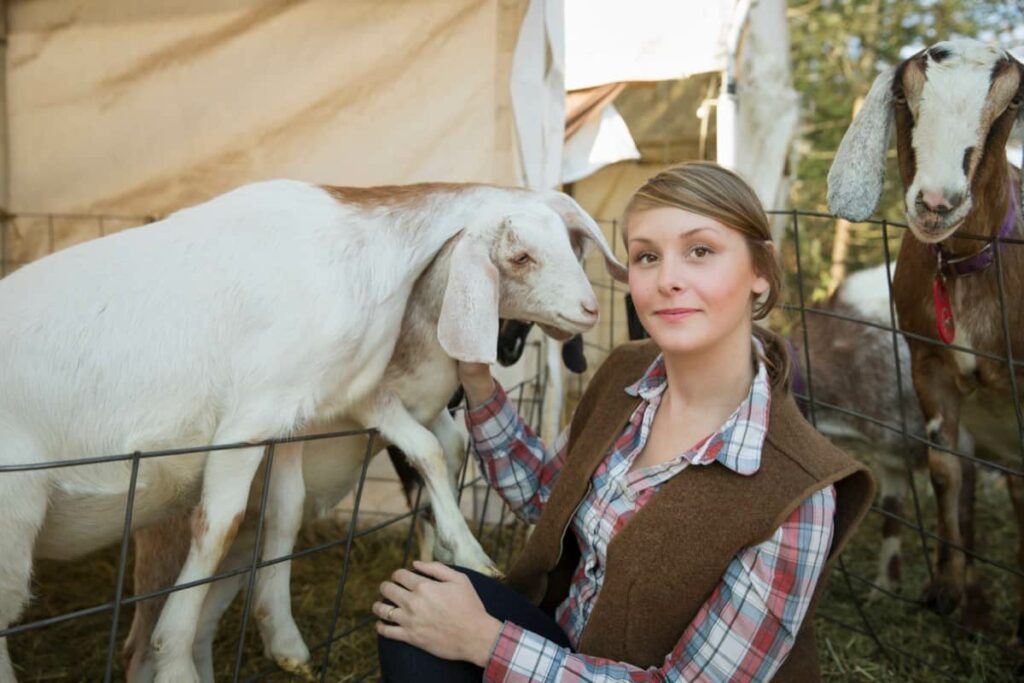Goats can thrive in harsh and low-fertility environments, feeding on available shrubs and trees. They are important to the economy and food supply of landless, small, and marginal farmers in India and many other countries. In rural areas, goat rearing is a common practice and is a source of additional income and insurance against disasters. The demand for goat meat is also high and continues to grow, making it a preferred meat.

In recent years, the market for goat farming has become more favorable, and entrepreneurs are showing interest in establishing commercial goat farms. As a result, several commercial goat farms are in various regions worldwide, with intensive and semi-intensive systems used for commercial production.
Entrepreneurship Opportunities in Goat Farming
Market Potential for Goat Farming
Goat meat has a significant market potential worldwide, especially in India, where it is preferred by many. The market for goat meat is growing faster than the population of goats, resulting in a 20% annual price increase. Goat meat is a high-protein diet with high nutritional value, making it popular in hotels, restaurants, and special occasions like parties and marriages. Direct marketing of animals can be highly profitable, as middlemen can reduce the price of animals.
There is also an opportunity to export frozen goat meat. The Bakri Id festival is a good opportunity for goat owners, as there is a high demand for goats during this period, with prices ranging from Rs 10,000 to Rs 50,000 per goat. The increased demand for goat meat has created a need for a large-scale, organized, and scientific method of goat rearing in controlled conditions, such as the stall-fed method.
Benefits of Entrepreneurship Opportunities in Goat Farming
- Profitable business: Goat farming is a profitable venture since goats offer many essential and profitable products like meat, milk, and fiber, and the demand for these products is high.
- Less capital investment: Compared to other livestock or cattle, goat farming requires less space and affordable facilities. They also need minimal management and care, making the initial investment low.
- High business growth rate: Goats reach maturity fast and produce kids once per year, making the business grow quickly.
- Easy maintenance: Goats are easy to manage, and the maintenance cost is low compared to other animal farms.
- Less labor cost: Anyone can run a goat farm with minimum education, making labor costs minimal.
- Government aid: Many governments offer resources and aid to goat farmers to help them set up and run their businesses.
- Easy to get investment: Many banks offer loans with favorable terms and conditions for goat farming, making it easy to get investment.
- Less risk: Goat farming has little management and disease risks compared to other animal farms, making it a risk-free business if done with proper planning.
- Marketing: Goat products have established markets, making it easy and cheaper to market them directly to consumers.
- Care and health management: Goats are healthy animals and adapt easily to any climate, with fewer disease outbreaks and cheaper treatment costs.
- Age factor: Goats reach the age of slaughter faster than other animals, making them a profitable option to yield fast income for the business.
Goat Farming Techniques
- The most common systems used for goat farming are intensive and semi-intensive systems.
- The intensive system involves confining goats to a small space where they can be managed easily, while the semi-intensive system allows goats to graze in an open area during the day and be confined at night.
- These systems are used for the commercial production of milk, meat, and other goat products.
- Moreover, there is a growing trend of using controlled conditions for large-scale goat farming. This technique involves using scientific methods of goat rearing to ensure proper feeding, housing, and health management.
- These controlled conditions ensure higher productivity and a better quality of goat products and reduce the risk of diseases.
- The scientific methods of goat rearing involve providing a balanced diet, ensuring proper ventilation, temperature, and humidity in the goat housing, regular health checkups, and timely vaccinations. These techniques ensure the goat’ maximum growth and productivity and provide a better return on investment.
In case you missed it: Technology in Goat Farming: Precision Farming, Automation, Different Types of Sensors

Business Opportunities in Goat Farming
- Meat production: Goat meat is in high demand and can be sold to local markets, restaurants, and grocery stores. The demand for goat meat is steadily increasing due to its nutritional value and low-fat content.
- Milk production: Goat milk is highly nutritious and is in demand for making cheese, yogurt, and other dairy products. Goat milk is also used as an alternative to cow milk for people who are lactose intolerant.
- Breeding: Goat breeding can be profitable, as purebred goats can be sold for a high price. Additionally, breeding goats can provide a steady supply of meat and milk.
- Goat fiber: Mohair and cashmere are two types of fibers obtained from goats. These fibers can be used to make high-end clothing, such as sweaters and scarves, which can be sold for a premium price.
- Fertilizer: Goat manure is an excellent source of organic fertilizer, which can be sold to local farmers and gardeners.
- Online sales: Goat farms can also sell their products, such as meat, milk, cheese, and fibers, online through e-commerce platforms.
- Goat products: Goat farms can also produce a range of value-added products, such as soaps, lotions, and candles, which can be sold directly to consumers.
Financial and Marketing Strategies in Goat Farming
- Seek financial support from government schemes, banks, or investors to establish and expand your goat farming business.
- Develop a unique brand identity and marketing message that sets your goat farm apart from competitors. This can include creating a website, social media presence, and branding materials.
- Identify target markets for your products, such as ethnic communities or health-conscious consumers.
- Producing value-added products such as cheese, soap, and lotion to increase revenue streams and attract a wider range of customers.
- Develop relationships with local restaurants, grocery stores, and other businesses that may be interested in purchasing your products regularly.
- Consult with professionals, such as accountants, marketing experts, and legal advisors, to ensure your goat farming business is financially sound and legally compliant.
Challenges and Risks in Goat Farming
Goat farming faces several challenges, including parasitic infestations, disease outbreaks, nutritional disorders, high kid mortality, poor breeding facilities, a lack of grazing lands, predator attacks, unorganized markets, feed and water scarcity, adverse climates, a lack of veterinary care, a lack of proper training, the high cost of goat sheds, and a lack of insurance coverage. These challenges result in significant economic losses for farmers.
Tips for Good Management Practices in Goat Farming
- Study your local climate, feed and fodder, and market before starting goat farming.
- Buy high-quality, healthy parental stock.
- Regularly test and deworm your goats based on fecal sample reports.
- Isolate and treat sick animals promptly.
- Conduct regular health checks and tests for common diseases like pneumonia, foot rot, and mastitis.
- Keep your farm clean and sanitary, and follow bio-security measures to prevent disease transmission.
- Use rotational grazing to help preserve pastures and reduce stress on goats.
- Follow seasonal management practices to help goats cope with climate variations.
- House goats separately, especially pregnant and young goats, and maintain identification and health records.
- Avoid mixing goats from different farms or species, and close markets during disease outbreaks.
- Control insects and external parasites regularly.
- Provide extra care for weak kids and separate them from other goats.
- Establish a separate goat market based on population and sell on live body weight.
- Milk goats and sell the milk as per the regulations.
- Provide access to veterinary care and only medicate goats with a consultation.
- Monitor and prevent dog bites, theft, and other risks in the area.
- Avoid grazing during thunderstorms or lightning.
- Establish government farms for locally adopted goat breeds and provide training and exposure to scientific goat farming practices.
- Change bucks regularly to avoid inbreeding and provide artificial insemination to reduce disease transmission.
- Properly dispose of goat droppings to prevent soil infections.
- Supplement goat diets with the mineral mixture and provide balanced rations based on their needs.
- Use trained dogs to protect goats from predators.
In case you missed it: Sustainable Goat Farming Practices: Eco-friendly Goat Raising Methods

Conclusion
Goat farming offers various entrepreneurial opportunities, such as meat and milk production, skin and fiber processing, and eco-tourism. Entrepreneurs can succeed and contribute to the industry’s growth with proper management practices, investment, and market research.
- Types of Grass Growing for Goat Farm
- How to Train Goats for Milking: A Beginners Guide
- Goat Milking Practices and Equipment: A Beginner’s Guide
- Goat Farming for Fiber: Producing Mohair and Cashmere
- Maximizing Goat Milk Production: Tips for Dairy Goat Farmers
- Goat Farming as a Family Business: Strategies for Success
- Profitable Kenya Goat Breeds for Commercial Dairy and Meat Business
- Unlock the Secrets of Oberhasli Goat: Discover Raising and Management Practices
- Ultimate Guide to Myotonic Goats: Explore Profile to Raising